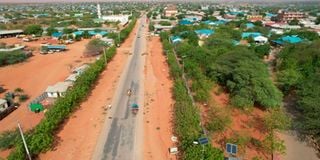Breaking News: At least 10 feared to have drowned in Makueni river
Mandera’s silent green revolution

An aerial view of Mandera town where trees have been planted along the road, at governmental institutions and homesteads as a climate change mitigation.
What you need to know:
- For Mandera County, the journey to mitigate effects of climate change started nine years ago through the ‘‘Adopt a Tree’’ project.
- Through this initiative, the county has since planted more than 250,000 trees, 80 per cent of them in Mandera town and its environs.
Nestled in the north-eastern corner of Kenya and bordering Somalia and Ethiopia, Mandera has always been a largely arid county. Mandera is among counties in Kenya with the lowest tree cover at only 3.6 per cent, just ahead of Marsabit, which has a tree cover of two per cent.
Tree cover refers to woody trees of at least two metres in height with a definite crown, excluding banana trees, tall shrubs or climbers.
In comparison, forest cover refers to the land area of more than 0.5 hectares with a canopy cover of at least 15 per cent of trees, at least two metres tall, which is not for agricultural or any other non-forest land use.
Now Mandera is silently and fast changing into a green county.
In recent years, Kenya has been experiencing erratic weather patterns that include cyclical drought and flooding, blamed on rising global temperatures as production of greenhouse gases from human activity continues on an unprecedented scale.
For Mandera County, the journey to mitigate effects of climate change started nine years ago through the ‘‘Adopt a Tree’’ project. Through this initiative, the county has since planted more than 250,000 trees, 80 per cent of them in Mandera town and its environs.
To do this, the county has been engaging the youth and women in communities, says Mohamed Ali Omar, the county’s outgoing Water, Energy, Environment and Natural Resources Executive.
Omar says the county has worked with 2,000 women so far to water trees in homes, along the town streets and in public institutions. Each of them has been allocated 20 trees to nurture. Families are also required to plant at least five trees in their homestead as part of the initiative.
For a county that has traditionally experienced acute water scarcity due to low rainfall and high rate of evaporation, finding water to nourish the trees is not easy. To keep the project alive, however, the county has installed water tanks in villages, which are fed by water bowsers.
“Our women do not struggle to take care of the trees because we have provided the water. The number of trees per individual is also manageable,’’ explains Omar.
Starting the project, though, was not easy. Many locals were unwilling to get involved, according to Hassanoor Abdullahi, the Mandera municipality manager. Over time, they embraced it and took part.
The result is a transformed town. Once a dusty, rugged and hot township, Mandera is slowly becoming a green hub that experiences a cooling effect from the trees. A green hub in the semi-arid jungle.
Participants are paid Sh10,000 at the end of the month. Says Abdulllahi: ‘‘Having a monthly income has made families stable. There are fewer disputes. The credit-worthiness of our women has also increased. They are more empowered.’’
This exercise is now part of the policy by the Mandera County government, with those engaged being the most economically vulnerable, often identified by the community, says the town manager.
Meanwhile, the project has brought together other government institutions for collaboration, with Moi Girls High School in Mandera, for instance, having planted more than 2,000 trees.

Students from Moi Girls Secondaryin Mandera water trees planted at their school .
Initiated by the outgoing Mandera Governor Ali Roba in 2018, the school community has now fully owned it, with drivers, security guards, teachers and students adopting trees to nurture. Those involved have replicated the initiative in their communities.
“The hot and humid environment is uncomfortable for the learners. By engaging in the tree-planting initiative, we have made the environment friendlier, says Amina Wako, the principal.
‘‘The gentle, cool breeze from the trees provides a perfect balance to the blazing sun. They also make our compound beautiful. The girls now have a park to have their group discussions during the weekend.”
“Unlike in areas that receive sufficient rainfall where trees can grow on their own, In Mandera County, we do not just plant trees but grow them as well. It is like a baby that you have to look after for three years,” says Roba, who is now the county’s Senator-Elect.
He adds: ‘‘We also wanted to make the project as sustainable as possible. For us, tree planting is a safety net programme for the poorest among our communities, mostly women.’’
The trees of Mandera are not only for beautification of the streets, but serve as a buffer for the road as well, protecting the road reserve from encroachment.
The project is designed to run for three years, after which women are allocated new sets of trees to look after.
“We are currently in the third generation of tree planting,” Roba says, arguing that climate change should be mainstreamed in budgeting programmes of both the National Government and county government if “we are to turn around the impact.”
‘‘The National Assembly should formulate laws to compel both levels of government to allocate more resources deliberately,” he notes.
Roba says he hopes his successor will continue with his legacy and expand the initiative beyond Mandera town to other parts of the county.





